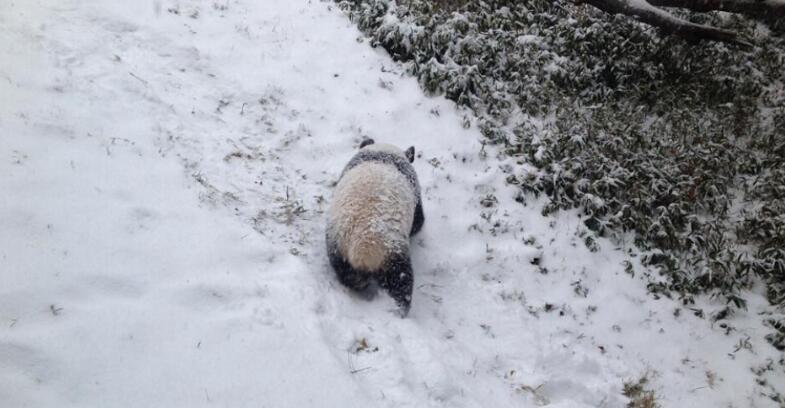An eight-day snowstorm raged from April 4 to 11 2013, trapping four surveyors from the census team and their five local guides in the Jiguan Mountains. We had to sleep on the snow in the open air for four nights and only managed to cover half the area we planned in the Anzi River Nature Reserve.
On day six of our expedition, the snow on the ground was so thick that we had no choice but to crawl on all fours. On the seventh day the weather changed to rain; such a nuisance for us traveling in the wild! In fact, it typically rains quite heavily this time of year in these areas. Imagine slogging through the bamboo groves at mountain elevations of 2,600m while snow melts off the bamboo leaves drenching clothing, gear, and the ground.
At last we reached a ridge and came across some giant panda feces, the purpose of our excursion. The feces were stale, but we suspected that there might be fresh feces nearby. We continued uphill as long as our legs could carry us. We came to a vast slope where 95% of the vegetation was made up of bamboo trees shooting as high as 1.7m; substantially taller than those we had previously observed.
The bamboo was so dense and had to be pushed aside before we could pass through. When we reached 2,700m in altitude the bamboo leaves were covered by a sheet of snow. Our limbs had gone numb and most of our clothing was wet through to the underwear. To our dismay we only found more stale feces to fill a big basket. With reluctance we began to descend at the insistence of our guides for we were all quite exhausted at this point.
When we came down to the Lingniu Road, we found that the bamboo on the roadside had just been eaten. We were certain the bamboo had been untouched when we passed here on our ascent; pandas must be nearby! I was excited and regretful at the same time. Had I just waited a bit longer instead of pushing forward, I could have had a good look at the creatures. A hunt following the chewed-on bamboo brought me to two fresh, warm rolls of giant panda feces in the middle of the road! With great care I picked them up and put them into a bag. What seemed like a quick job actually took me ten minutes or so, as my hands had gone numb with cold and were reluctant to obey me. Trying to avoid contaminating the samples by touching them while measuring and jotting comments in my notebook was a challenge with stiff fingers. A little further along found another two rolls. I figured that a panda must have heard intruders coming in the middle of defecating and had to flee to safety. The scattered arrangement of the feces on such a gradual slope indicated that the animal must have been running and defecating at the same time.
After successfully collecting a good harvest of giant panda feces, we hurried down. We were so cold that the stream we had to cross at the foot of the mountain felt hot on our feet Back at the camp we changed into clean, dry clothes, made a bonfire, and dried our garments that had absorbed a distinctive smoky odor, particular to these mountains. In the afternoon, clouds gathered and darkened overhead and at dusk, a heavy snow fell and blanketed the landscape in white. It was a good harvest as everyone collected several samples. We spent another night on the snow-covered ground with the victory of success fresh in our minds.






















































































